The Spring 2009 Anime Preview Guide
Carl Kimlinger
by Carl Kimlinger,
Carl was once praised by an ex as combining “the looks of a mutated toad with the malodorous charms of a road-killed skunk.” He tries his best to bring that same appeal to his reviews. Carl lives in one of those places that residents think is tops but the rest of the world soundly ignores—it's called Oregon—and splits his spare time between robbing graves for mad scientists and modeling for “plus-size” men's magazines. He's an avid consumer of violent action and bittersweet romance, and he greatly appreciates that anime so often combines the two.
 Hatsukoi Limited
Hatsukoi Limited
Rating: 3 ½
Review: Given the dearth of straight-up romance this season, this may well be the last, best hope for the romance fans out there (Cross Game excepted). The series promises a variety of first-love-related stories, but for now it focuses on Ayumi Arihara, a middle-school girl who dreams of one day being confessed to by a boy. Her dream finally comes true when an enormous, afroed punk hands her a love letter, but naturally Ayumi is less than entranced. In fact, she's terrified. Head full of rumors about girls who are attacked by the men the reject, Ayumi lets the boy—Zaitsu by name—follow her around for a week. Eventually the stress gets unbearable; she can't sleep and her more timid friends are feeling terrorized. She gathers her courage and in tears, tells him that he's making a nuisance of himself. Devastated, Zaitsu desists, leaving Ayumi open to abduction by some local punks who plan on blackmailing him into accepting a beating.
The episode takes too long to get inside Zaitsu's head, and frankly, the way the girls treat him—while certainly realistic—doesn't reflect well on them. But eventually it does get inside, and watching Ayumi finally adjust her opinion of Zaitsu is all the more satisfying for the ill-treatment he received earlier. Is it too much to hope for that a hulked-out, ugly punk (with a heart of sugary gold) be seriously considered as a romantic interest? Maybe, but even so this episode displays a sensitivity (the scene in which Ayumi tells Zaitsu off is darned near heartbreaking) that bodes well for future emotional developments. The humor doesn't always work, and as of yet the other girls are little more than stereotypes, but like any good romantic comedy it's funny when it needs to be, romantic when it should be, and damned good-looking in the bargain. The huge female cast is downright delectable, the fan-service lovingly animated, and the overall look realistic—what's not to like?
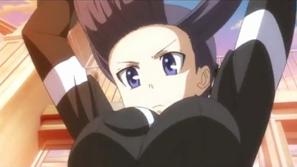 Asura Cryin’ Episode 2
Asura Cryin’ Episode 2
Rating: 2
Review: Asura Cryin’ is a perfect example of a show that's complicated without being particularly complex. There's a lot of stuff going on, various factions doing their thing, people making plans and maneuvering around one another, much of it while essential information is being withheld. But ultimately it's all pretty mundane, a collection of prefabricated plot elements given a superficial gloss by their sheer density and some artless obfuscation.
Though not exactly comfy, Tomoharu manages to sleep the night away in his violently ventilated new home. The next day he pays a visit to his landlord to explain how he managed to destroy his house in one measly night. By happy accident, he meets Takatsuki on his way back home and learns that she is indeed the same girl who attacked him two nights before. She's also the sole heir of a family of demons masquerading as yakuza. Later he learns that the student council (the fashionable thugs who abducted him the previous night) is actually an organization of anti-demon crusaders willing to go to any lengths to keep Tomoharu's newfound power out of demonic hands—up to and including murder.
The more the show reveals, the less appealing it gets. At least when obscured you can half-convince yourself that the plot might actually be interesting. When exposed to the pitiless light of day, it instead proves to be a creaking lattice of tired clichés: a sadly uninspired tale of strife between the forces of the sacred and profane where the sacred forces are prone to draconian self-righteousness, the “evil” forces turn out to be basically human, and Tomoharu is the wild card that can turn the tide in either direction. Even the show itself seems bored with its plot, drifting frequently into harem comedy...which as one might guess only makes things worse.
 Hayate the Combat Butler Season 2 Episode 2
Hayate the Combat Butler Season 2 Episode 2
Rating: 3
Review: Since the first episode was wasted on none-too-entertaining introductions, it's pretty safe to call this the first real episode of Hayate the Combat Butler’s second season. It's everything the first episode wasn't: lively, funny and self-referential as hell. Having lost the relay, and thus her wager with head butler Klaus, Nagi is forced to fire Hayate. Pissed, she also fires Klaus, who has a sudden change of heart and decides to give good ‘ol Hayate a second chance. If Hayate can withstand the intensive butler training at the Butler's Tiger Den, then he can be reinstated as Nagi's personal butler. On his way to the Den, Hayate naturally befriends a girl, and an exceptionally odd one at that: a crude, violent and gluttonous (but cute!) nun. Who also quite naturally runs the Den, giving Hayate his first butler's test: gather a party and explore the dungeon below her church. Let the turn-based action begin!
Hayate’s second episode kicks around some random anime references, takes a few digs at grumpy fans and its own broadcast time-slot, and then plunges with nerdy zest into an inexplicable RPG parody. Which just about puts to rest any worries about laid-back director Yoshiaki Iwasaki's effect on the series’ all-important energy level. Full of silly violence, silly banter and winking geek-centric humor, this episode is prototypical HtCB, right down to the tiny morsel of gravitas when Hayate and Nagi wonder what to do if Hayate fails his test. Whether you loved, hated, or completely forgot about season one, you'll likely have the same reaction to its sequel.
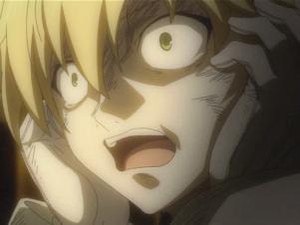 Pandora Hearts Episode 2
Pandora Hearts Episode 2
Rating: 3
Review: Oz's coming-of-age ceremony gets fully underway as the good and the great gather for his party. Oz takes some time out before the ceremony proper to flirt outrageously (and ineffectually) with Sharon, the young heiress of the Reinsworth family, and then hits the main hall for the night's big event. The ceremony falls apart, however, when the long-silent clock that Oz swears his oath by awakens, followed by a sneak attack by a group of hooded warriors. But before the Hooded Ones can complete whatever arcane ritual they are enacting, the girl from Oz's vision interferes and, in the form of a giant humanoid rabbit, beats them brutally down. Far from helping, though, the girl delights cruelly in Oz's misfortune as the confrontation ends in tragedy, dooming him to confinement in the fabled prison of Abyss.
Pandora Hearts does so many things right. It puts Yuki Kajiura's top-flight score to good use, and is quite effectively atmospheric, building a nice sense of dread before unleashing the pains of hell on poor Oz. There's a lot of “people behaving mysteriously” mumbo jumbo, but contrary to the norm, the mumbo jumbo is genuinely mysterious. Watching Ayako Kawasumi play viciously against type (as the twisted Alice) is a joy, and the episode's final act is a nasty bit of work that leaves Oz in a very interesting place emotionally speaking. With all of those good qualities, it's a special kind of painful to watch the show commit stylistic suicide by yoking itself to a series of action scenes that, to put it delicately, suck ass. Poorly animated, badly paced, and lethally uncool, they're ugly little reminders that director Takao Kato was indeed the guy behind the action-retarded shonen vehicle Buso Renkin.
 Phantom – Requiem for the Phantom Episode 2
Phantom – Requiem for the Phantom Episode 2
Rating: 4
Review: ...And now the show downshifts. Anyone familiar with Koichi Mashimo's girls-with-guns shows knew this was coming. His previous entries in the genre are justifiably infamous for their deliberate (or pokey if you will) pacing, and Phantom is clearly following in their footsteps. Compared to the measured solemnity of this episode, the easy pace of the first episode seems practically antic. The series’ second episode is fully twenty-five minutes of Zwei training and struggling to come to grips with his murderous new life. The closest it gets to gun-flashing action is one sniper kill and a whole lot of target practice.
Sound boring? For some it will be. This is where we separate the boys from the men, or more accurately, the impatient from the patient. The series sells its secrets dearly, doling out information in tiny particulates, and its characters grow and are revealed at a similarly glacial pace. This is the type of show where an entire episode can be devoted to the poisonous process by which its assassin leads are deprived, not only of their memories, but also their emotions and free will.
It's a slow, cold seduction, driven by atmosphere as much as plot. Rather than push forward, the series takes the time to immerse us in Zwei's alienation and dissociation, preferring that we feel his world rather than understand it. It's at once beautiful and icily hypnotic. The scenes of Inferno executives sitting in Jacuzzis and making cryptic comments disrupt but hardly ruin the atmospheric creep.
The dirty old man in me feels compelled to note that this episode also includes some top-notch Ein fan-service.
 Marie and Gali
Marie and Gali
Rating: 2
Review: Of the uber-short comedies this season, Marie and Gali is far and away the strangest. Given that its competition includes a show about a bearded, chicken-shaped mutant (Higepiyo), that's saying something. But even chicken-shaped mutants are no match for a comedic physics lesson starring a loli-goth girl and Galileo.
The story, such as it is, revolves around Marie, a quiet girl in frilly loli-goth garb who discovers on a train one day that her stuffed rabbit-thing has come to life. While chasing it through a strange town, she enters the Leaning Tower of Pisa (which curiously enough isn't leaning), only to learn that the tower is the lair of crazed scientist Galileo. Galileo helps her to catch her fleeing toy, in the process ejecting all three of them from the tower. Whereupon they learn that all objects fall at the same rate regardless of mass—provided, of course, that they have the same air resistance.
Much like Chi's New Address, Marie and Gali is a short-form comedy that isn't terribly funny. Unlike Chi, Marie is frantic in addition to being unfunny, and has a strange educational punch-line to boot. Its look is all high-gloss cartoony simplicity (Marie) and sloppy American-style energy (Gali), while its story is all free-form goth-lite hi-jinks. Like pretty much anything that clocks in at five minutes, this is children's entertainment tailored so exactingly to their standards that no one else is likely to enjoy it.
 Shinkyoku Soukai Polyphonica Crimson S
Shinkyoku Soukai Polyphonica Crimson S
Rating: 2
Review: In magical-fantasy-alternate-anime-reality-land, spirits exist and are contracted to special humans from whose music the spirits gain their power. Phoron, a lonely unsociable child, encounters one such spirit while singing on the roof of his orphanage. The spirit, voluptuous Corticarte Apa Lagranges, takes a liking to the boy's voice, but before she can do anything about it, she's chased off by a pursuing spirit. Twelve years later Phoron is training to become a Dantist (spirit master), but just can't seem to make the cut. That is, until an impromptu song breaks Corticarte from her prison, allowing her to pay the shocked boy a rather explosive visit.
If you're wondering whether the world really needs another pseudo-romantic magical adventure based off of a visual novel (especially after being subjected to Tayutama), the answer is no. Not that Crimson S is terrible; it's just unnecessary. More pleasantly paced than is the norm and featuring some surprisingly solid action, Crimson S—a prequel to the original Polyphonica series—also has a considerable amount of back-story to unload, so it comes across as marginally less empty-headed than most of its ilk.
But even the decent bits have been done before (many times, and many time better), and the bad bits are bad indeed. Phoron is as bland as anyone would dare to fear, and one should beware any series that ends its first episode with girls pulling at some hapless schmuck like a couple of oxen at a medieval drawing-and-quartering. Experience will tell you that all too often dismemberment is preferable to watching what inevitably follows.
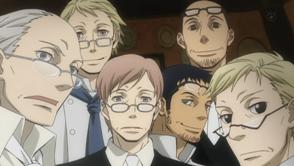 Ristorante Paradiso Episode 2
Ristorante Paradiso Episode 2
Rating: 3
Review: Uncomfortable with depending on her undependable mother for her living expenses, but unwilling to leave while her feelings for Claudio remain unresolved, Nicoletta decides to get a job. When she can't think of a job she feels justified in committing herself to, she ends up spending her afternoon cooking for Luciano and Gigi. Still feeling restless, she brings Claudio to her apartment and, after discovering that he is in reality not married, promptly tries to rape him. As a method of deepening their relationship it proves ineffective, as it merely makes Claudio uncomfortable around her, but it does prompt some soul-searching on her part, which leads her to a decision to pursue cooking as a career.
No points for guessing where she ends up working. Despite Nicoletta's rather shocking forwardness, this episode finds the series drifting further from the kind of trashy, grown-up romance that it could (and probably should) have been. Claudio's restraint when confronted with an aggressively horny Nicoletta, while morally commendable given her obvious confusion, is narratively unfortunate (and dare I say kind of pathetically effeminate). With Claudio acting like an embarrassed teenager, their relationship acquires a dispiriting resemblance to a bashful teen romance. It's refreshing to see a female lead who so unapologetically pursues what she wants, and Nicoletta's relationship with her mother is getting healthier, but unfortunately Ristorante Paradiso displays here neither the focus nor the audacity necessary to fulfill what promise it has.
Ristorante Paradiso is currently available streaming on Crunchyroll.
 Tayutama
Tayutama
Rating: 1 ½
Review: Thank god for porn games. This season has been a little short on total crap, but if there's one thing you can count on to completely suck, it's another big-haired, dewy-eyed adaptation of some random bishojo ero-game. Tayutama throws in some mystical action, but basically follows the same template as any such adaptation: normal guy gets mixed up in some contrived situation that puts him in close proximity to a variety of girls, from whom he must choose a romantic interest. So far this episode we are introduced to the obligatory platonic girl friend, the obligatory ice queen, and the obligatory magical interloper who lives with the hero and insists that she's his wife. Yay.
The contrived business in this case involves the uncovering of a magical seal by local construction workers. Lead character Yuuri happens to be the heritor of a local shrine, and takes it upon himself to communicate with the spirit that controls the seal, a powerful being called Kikurami Kaminohime. Before they can get the whole seal business squared away, however, three powerful monsters manage to escape. In the ensuing chaos, Kikurami takes physical form, but incomplete as she is (she has the appearance of a child) she cannot restrain the three. Afterward Yuuri promises the child-Kikurami that he'll marry her when she grows up, which of course happens the very next day.
The very best of this type of show are based on works by Key, whose Kanon and Air set high standards for emotional intensity. The worst are directed by Keitaro Motonaga. Guess who has the reins this time. There is some relatively painless business involving cute but mischievous spirits and a hilarious performance by Norio Wakamoto as Yuuri's father, but they can't balance out child-Kikurami's hive-inducing lisp, Yuuri's personality (which has all the charm and flavor of a badly boiled potato), or Motonaga's brutally strident direction.
 Hanasakeru Seishounen
Hanasakeru Seishounen
Rating: 2
Review: A fierce corporate princess agrees to play a bizarre marriage game in Studio Pierrot's uneven dramatization of Natsumi Itsuki's old-school shojo manga. Kajika is the name of the princess, and we first see her as a carefree child on a tropical island where she lives with her silver leopard and stoic companion Fan Li. Later, the now-grown Kajika transfers to a school in Japan. There she meets and befriends stereotypical normal girl Yui and wins over her class's hostile factions with a combination of poise, kindness and cross-gender sex appeal. Her father, Harry, recalls her after a month, and when she returns to America he blindsides her with a deeply weird proposition: he will choose three men, whose names and identities will be unknown to her, and set up meetings. She is to fall for and woo one of these men; only then will she be told her destiny.
The set-up smacks of those strangely sadistic premises that shojo stories sometimes have, and indeed there is a hint of sadism, particularly in Harry's assignation of Fan Li to the position of game overseer when it's plain for all to see that he's smitten with Kajika. However, with a lead as pleasantly self-possessed as Kajika, it's unlikely that the narrative sadism will get out of hand. More troubling is the choppy pacing and haphazard plotting. The story hops around like a maddened toad, and poor Yui (among others) goes MIA halfway through the episode and is never mentioned again, dropped like a hot turd into the narrative void. Still, the fact that Studio Pierrot went to the trouble of animating a twenty-year-old manga can't help but pique one's interest. Perhaps it irons out the bumps further down the road.

K-ON! Episode 2
Rating: 3
Review: It's based off of a four-panel gag manga (the equivalent of an American comic strip) so perhaps it's a bit unfair to expect K-ON! to go much of anywhere, but even so one can't help wishing that it would get a move on. For its second episode the show deals with the epic, convoluted subject of...buying a guitar. The girls eat lots of sweets, talk about why they chose the instruments they did, shop around, and even get a part-time job. Oh the adrenaline. And their part-time job—get this—is counting cars. My god, will the madness never stop?
To be perfectly fair, the music club does lend the show more structure than your average cute-girls-doing-cute-things comedy. Even if it's just buying a guitar, this episode does get the light music club one step closer to their goal of performing together, and when Yui sounds her first electric guitar note, the moment—essentially the moment that the band is truly born—has real gravity.
However, the series’ main goal is, and likely will remain, comedy so light that it's liable to float off on a cloud of spun sugar. The folks at Kyoto Animation are far more concerned with how impossibly cute Yui and her band-mates are than with the magic of making music. And in its own empty-calorie way, that's fine. But that doesn't stop one from returning time and again to that one vibrating note and the promise it holds of a little meat amidst the dojikko syrup.
 Eden of the East
Eden of the East
Rating: 5
Review: I am not a fan of Kenji Kamiyama. A great many people love his series, but I find his direction to be cold, impersonal and off-puttingly self-conscious. Which makes this warm, funny and oddly romantic political thriller all the more mysterious. On a personal mission to throw a coin into the White House fountain, Japanese tourist Saki Morimi is spotted in the act by a couple of burly police men. But before they can throw her whimsical rear in the slammer, they are lured away by an armed nudist. As thanks for his timely interruption, Saki gives the nudist her hat and coat—it is cold after all—before quickly and prudently fleeing the scene. The man, having impetuously saved Saki seconds after awakening cold, naked and sans memory across the road from her, gratefully accepts her gift and leaves. Which would be the end of their association were it not for Saki's belated realization that her wallet and passport are still in her coat.
It's a weird and charming start to a weird and charming show. As if to symbolize the break with his robotically perfect past, Kamiyama taps Chika Umino for the series’ simple but expressive designs and fills his opening episode with all the humor that his previous excursions lacked. The first few minutes of Eden are some of the funniest in recent memory, and the interplay between Saki and her naked “prince” is priceless throughout, waxing sweet as the episode progresses. Both leads have a conspicuous excess of likeability, and Kamiyama displays a mastery of smiling humanism that would have been unthinkable earlier in his career. He doesn't abandon the identity issues and political concerns of his work on Ghost in the Shell: Stand Alone Complex—the debt Eden owes to The Bourne Identity is considerable—but he does for the first time temper them with warmth and a genuine affection for his characters. The result is, in a word, superb.
 07-Ghost
07-Ghost
Rating: 1 ½
Review: 07-Ghost (AKA Attack of the Bishonen Part XVII) is the tale of Teito, a pretty boy who attends a military academy in the Barsburg Empire. He has a pretty best friend with whom he occasionally (but platonically) shares a bed, pretty rivals who resent his talent and low-born status, and pretty instructors who push him hard during the final exams. Teito is quite naturally an amnesiac, as well as a crack soldier, the latter of which insures that he is among the mere twenty students who actually graduate from the academy. But before he can ride the fast track to success, a chance encounter with a notoriously ruthless officer changes his fate. When Teito overhears the officer discussing some mysterious business involving a mysterious rock, he recalls fragments of his past, including a glimpse of the pretty officer murdering Teito's pretty father. In an unthinking rage, Teito assaults the man, only to end up defeated and imprisoned. That night Teito makes his escape and begins his life as a fugitive.
If you're a fan of pretty boys, pretty men, or even reasonably pretty geezers, then 07-Ghost will most definitely scratch your itch. If you're a fan of excitement, visual panache or originality, then you're screwed. This isn't a show, it's a bishonen buffet. The density of leggy, androgynous BL-bait is pretty amazing, in a runway-walk, fashion-show kind of way. Unfortunately the show is so busy cramming in the pretty faces that it leaves itself little time to develop them into actual characters. Which makes for some fine clothes horses, but lousy audience identification. Add to that laughable fights and a sloppy script about Super Special Boys with Super Special Powers fighting against a Super Evil Organization, and you get the kind of creatively bankrupt cliché-poo that gives anime a bad name.
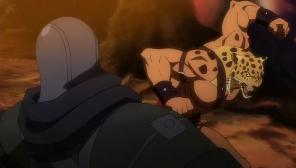 Guin Saga
Guin Saga
Rating: 3 ½
Review: A midnight raid by a horde of Mongohls destroys the ruling house of Palo. Only the king and queen's youngest children, Linda and Lemus, known as the “twin pearls,” manage to escape. Transported into a hostile wilderness by the strange device used to teleport them away from their pursuers, the two survive by hiding in the brush and eating berries. Unfortunately Lemus's incessant whining (the berries taste gross!) attracts the attention of a nearby Mongohl patrol. Quickly overwhelmed and in real danger of being slaughtered, the two children get a most unusual helping hand when their struggle awakens a slumbering behemoth, a leopard-headed hulk of a man who crushes the Mongohl soldiers with animal ferocity. The man collapses immediately thereafter, and though Lemus protests, Linda nurses him back to health. Once well enough to talk, the man proves to be as confused as they. He has no memory of who he is, how he got to the forest or why he has the head of leopard.
Don't watch Guin Saga because you want epic fantasy or appealing characters—though it does have its share of both. Watch Guin Saga because Guin kicks ass. Serious ass. Not slick, little-kid shonen ass, but big, burly Robert E. Howard ass. Lemus is an insufferable sissy, the character animation is kind of flat, and Guin's dialogue is cheesy enough to lure wharf rats into your living room, but one glimpse of Guin planting Mongohl heads like Irish spuds and all of those misgivings disappear like smoke. To be sure, the series has its other strengths: The length of the original novel series (100+ volumes and still counting) promises a world of some depth, Studio Easter's backgrounds are simply gorgeous, and Final Fantasy's Nobuo Uematsu serves up a spectacularly epic score. Even little Linda adds her own charm by offsetting Lemus's sniveling spinelessness with some real royal backbone. But ultimately this is Guin's show, and it...well, shows.
 Ristorante Paradiso
Ristorante Paradiso
Rating: 3 ½
Review: Whether you enjoy this show or not will depend almost entirely on your reaction to the sight of a twenty-year-old girl mooning over a reverse harem of middle-aged men. Nicoletta returns to Rome after a long absence to hunt down her flighty mother Olga. Abandoned by her fifteen years ago, Nicoletta has finally grown sick of Olga's selfish ways and has made plans to introduce herself to Olga's unsuspecting husband. She tracks her mother down at her husband's restaurant, a bustling business manned by a crew of well-preserved older men. Unfortunately she allows herself to be bamboozled into giving her mother a stay of execution, a charitable act that her mother repays by blowing her off the next day. Afterwards Nicoletta runs into Claudio, the restaurant's head waiter, and spends the day hanging out at the restaurant, an act that becomes a habit as her attraction to Claudio grows.
To be fair, this isn't exactly a single-issue show. The series' idiosyncratic look is bound to raise a few eyebrows—particularly the rather creepy designs for the stately restaurant gentlemen—and Nicoletta's detestable mother will turn away more than a few viewers. But in the end it's the potential for wondrously unhealthy (and perhaps unwholesome?) developments to come that will determine whether one stays for the duration or runs like a scalded monk. As of yet it's difficult to know if the series will capitalize on that potential (though the next-episode preview is loaded with scandalous promise), so until it does, fans of ugly, grown-up emotions will have to make do with Nicoletta's spectacularly dysfunctional relationship with her mother. Which is nothing to sniff at itself.
Ristorante Paradiso is currently available streaming on Crunchyroll.
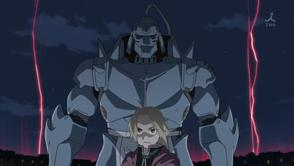 Fullmetal Alchemist: Brotherhood
Fullmetal Alchemist: Brotherhood
Rating: 3 ½
Review: I've always found Fullmetal Alchemist’s carefully balanced mixture of action, humor, tragedy and politics to be somewhat mechanical, its ratio of each too obviously calculated to be pleasingly organic. That of course doesn't stop it from being intelligently written or highly entertaining (and addictive), and this second adaptation is no exception. Brothers Alphonse and Edward Elric are alchemists working for the state. An alchemical accident years ago deprived Ed of an arm and a leg and left Al as nothing more than a soul affixed to a suit of armor. On a quest to restore his and his brother's bodies—even at the cost of being branded a military lapdog—Ed has joined the army as the youngest (and possibly shortest) State Alchemist of all time. The position brings with it information-gathering privileges, but also duties, such as the apprehension of a rogue alchemist whose control over water allows him to either freeze or boil his opponents from the inside out. A dangerous foe, to be sure. But then, Ed's no slouch himself.
While ultimately serving as an independent work—it's a remake rather than a sequel—Brotherhood also assumes familiarity with the first series, making for an awkward mixture of knowingly recycled schtick (“don't call me short!”) and character (re)introduction. Given the episode's high entertainment quotient, that's a niggling complaint. So why mention it? Or for that matter, my opinion on the first season's artificiality? Call it a perspective check. Fullmetal Alchemist is best approached, not as the transcendental masterpiece some would make out to be, but as smart, superior fantasy. This episode won't meet any towering expectations, and if you're busy wallowing in the disappointment of having had them brought low, it's all too easy to miss the series’ very real charms: Yasuhiro Irie's magnificent action direction, the likeable cast, and most importantly, the hints of emotional intensity and moral and social complexity that will doubtless bear delicious fruit down the line.
Fullmetal Alchemist: Brotherhood is available streaming on Funimation's official website.
 Tears to Tiara
Tears to Tiara
Rating: 3 ½
Review: You can always recognize an Aquaplus creation by its female-heavy cast, leisurely pace, and distinctive yet curiously bland character designs. Other than that, though, series based on their works tend to be quite different. Surprisingly so, since they all start out as pornographic PC games. Which is why it comes as a bit of a surprise that Tears to Tiara could almost be a conceptual sequel to Utawarerumono. Both are medieval fantasy adventures featuring mysterious leads whose moral alliance—good or evil—is ambiguous, and both are solid (though hardly brilliant) entertainment.
A small town in the boondocks is overrun by the soldiers of Drwc, the scuzzy high-priest of the nearby Divine Empire. The town oracle Riannon, who has foreseen the invasion and already evacuated the townspeople, goes out alone to meet the oncoming troops. Drwc, though dismayed to discover that there are no women left in the town, is delighted when he learns that Riannon is a descendant of an ancient Elf king. He needs such a descendant to serve as a human sacrifice during the ceremony he is about to enact, a ceremony that will resurrect the dreaded demon king Arawn. He quickly leverages her into accompanying him and sets about his mission, unaware that her brother Arthur and a crack squad of barbarian warriors is hot on his trail.
As with most series based on Aquaplus games, Tears to Tiara is pokey and riddled folks who sit around jawing when they should be taking action. The first half of this episode is basically one long conversation between Riannon and Drwc, and Arthur's pursuit is constantly disrupted by needless dialogue. But ultimately it doesn't matter much: the detestable Drwc makes an excellent villain, the tension is built well, and the final scenes (not to mention the opening credits) promise some intriguing role reversals to come.
 Cross Game
Cross Game
Rating: 5
Review: If there were a higher grade to give, I'd give it. Though best known for his baseball stories, manga-ka Mitsuru Adachi is one of Japan's premiere poets of normal life. And Cross Game finds him in top form. Kou Kitamura lives next door to the Tsukishima family's batting center and cafe, where he delivers baseballs from his own family's sports store and occasionally kills time batting in one of their cages. The Tsukishima family has four daughters, one of whom, Wakaba, was born on the same day—and in the same hospital—as Kou. Though still too young to honestly admit to it—he's only in fifth grade after all—Wakaba is basically Kou's girlfriend. Wakaba being the cutest girl in class, this naturally rubs the less fortunate boys the wrong way. When forced to take refuge in a local baseball game from one such group, Kou demonstrates startling skill with a bat (and utter incompetency with a mitt). Afterward Kou begins practicing, but before anything can come of it, tragedy derails his life.
The story is simple and the characters straightforward, but like a crystal chime, every moment, every emotion rings beautifully true. This is Adachi's gift. He writes delightful dialogue and, as later episodes will doubtless prove, excels at unpredictable sports action, but the genius of his works lies in their ability to convincingly evoke real life. In lesser hands this episode's final act would have been grossly manipulative, but in Adachi's it is achingly sad and heartbreakingly honest. While too soon to tell if this will rank with his masterworks—it's competing with Touch, one of anime's stone-cold masterpieces, after all—Cross Game, like the best of Adachi's work, is subtle yet potent, unique and yet universal...kind of like life.
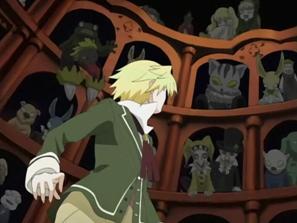 Pandora Hearts
Pandora Hearts
Rating: 3 ½
Review: Behind the porn-game name lies a spooky supernatural thriller that plays its creepy cards just close enough to its chest draw one inexorably in. The series focuses on Oz, the restless heir of the noble Bezarius family. On the day of his coming-of-age ceremony, Oz spends the morning dodging the adults who want to spoil his day with party preparations. Accompanied by his small sister Ada and servant/best friend Gil, he whiles away the hours exploring. Lured by the sound of a music box, he discovers a mysterious watch in an ancient underground tomb. The watch triggers a vision of a girl in a suffocating room full of living toys who at first welcomes him as an old friend and then tries to kill him. Even after the vision retreats, Oz is haunted by a vague feeling of unease, unease that is cruelly vindicated when an evil force takes control of Gil's body.
The series isn't much to look at, Xebec churning through the visuals with their usual mediocrity, but it does have its share of effectively unsettling images. The room of toys is a nightmare of corrupted cuteness, and director Takao Kato knows how to milk apprehension from the cryptic eyes of his cast. Even so, the series’ horror undertones owe most of their effectiveness to the script, which paves the way to Oz's coming-of-age party with forbidding hints that something is very wrong, and to Yuki Kajiura's score—her eeriest in years. Ayako Kawasumi's mercurial performance as Alice, the girl Oz meets in his vision, keeps one guessing at her true intentions, and screenwriter Mayori Sekijima withholds just enough information to end the episode on an intriguingly vague note.
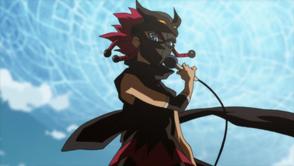 Basquash!
Basquash!
Rating: 4
Review: They say the tale's in the telling. If you ever needed proof that that's true, Basquash is it. The tale isn't much—just your run-of-the-mill boy-with-a-dream-discovers-sports story—but it's told with such verve and vigor that it can't help but be king-sized fun. Be forewarned, though: it has more than its share of self-conscious ‘tude. And a talking animal sidekick named Spanky.
Dan is the boy and his dream is to one day make it to the lunar city of Mooneyes, where he can get his grubby sewer-rat hands on the technology to cure his paraplegic sister. A skilled basketball player, he uses his skills to run wild in the streets, dressing as his alter ego Dunk Mask and busting up televisions so his friends can salvage the parts and pawn them off. The current craze in basketball is BFB—basketball played with robots called Big Feet. Dan blames the sport for his sister Coco's condition, and consequently despises both BFB and Big Feet. Until he meets busty Miyuki, a Big Foot enthusiast who teaches him the true capabilities of the machine. Fed up with how badly the BFB players pilot their machines, Dan and Miyuki decide to crash a game to show the schlubs how basketball is really played. With disastrous results.
Basquash unfolds in a riot of color, careening heedlessly ahead as it pushes its threadbare story to its limit. The episode is basically one enormous chase scene, a chain of Wile E. Coyote stunts featuring retro-cool legged cars and a ball of spiky-haired spunk masquerading as a lead character. It moves with such indefatigable energy that the unexpected twists (e.g. the consequences of Dan's BFB game) are almost lost in the kinetic shuffle and even the weary clichés feel fresh. Thomas Romain's intricate future-slum art direction and a small platoon of silly character designs provide background support while Satelight delivers an astounding level of pure CG energy.
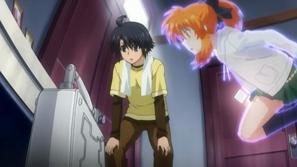 Asura Cryin’
Asura Cryin’
Rating: 2
Review: Anime cryin’. Cryin’ because all the good ideas are taken and what's left are recombinant genre mash-ups like this. Take a schoolyard romance, cut it with some mecha action, throw in a dash of supernatural conflict and voila, a new anime series. But no new ideas. Tomoharu is a perfectly normal high school boy. He's got a mildly perverted best friend, is well-liked at school and has cute but dead girl haunting him. Not that he minds; he gets along well with the deceased Kanade and heck, she sleeps half naked above his bed. All very normal. But normalcy never lasts long in mecha mash-up land. While moving into new digs after his newlywed mom kicks him out, he receives a suspicious suitcase from his globetrotting elder brother that prompts a beautiful girl with mismatching eyes and a snazzy priestess’ uniform to attack him in the dead of night. And the next night he's ambushed yet again, this time by a group of snazzily dressed thugs. The attack is interrupted by the heavily-armed advisor of his chemistry club, who in turn is interrupted by a platoon of yakuza foot soldiers. In the ensuing chaos, Tomoharu opens the case and from it, rather improbably, crawls a giant robot.
Asura Cryin’ crams a lot of plot into its first episode, tossing out mysterious fragments as if hoping that one will accidentally snag some viewers. It isn't a bad strategy; with as many unexplained plot threads as this episode introduces—ghostly Kanade, the warring thugs, the mecha that pops out of a suitcase of slime—one of them is bound to interest someone. So long as that someone doesn't mind their anime recycled. That everything in the series, from the dull lead to his mecha-piloting destiny, has been chewed up and regurgitated by better shows wouldn't matter if it were Frankensteined together in an original manner, but so far the series is all frantic audience-baiting and no inspiration.
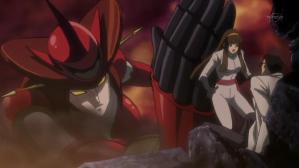 Shin Mazinger Shougeki! Z Hen
Shin Mazinger Shougeki! Z Hen
Rating: 4
Review: The first episode of Shin Mazinger is called “Finale.” Which is exactly what it is: the frantic death knell of a series that we have yet to see. End-first series often feel gimmicky, but if you were expecting Shin Mazinger to come across contrived, you figured without director Yasuhiro Imagawa. A hoary veteran of super-robot nostalgia, Imagawa front-loads Shin Mazinger’s first episode with an entire series’ worth of action, packing the opening twenty minutes until they buzz with infectious old-school energy.
Naturally, as we have yet to see what led to this episode's events, not a lick of it makes any sense. This much is for certain: Kabuto Kouji, the pilot of Mazinger Z, is locked in the battle of his life—with giant robots, evil scientists, tentacled monsters, and even an evil general's flagship. Other than that... The rest is a kaleidoscope of a dozen different kinds of deadly peril, last-minute rescues, insensible jumps through time and space, glowing girls, bouncing disembodied heads, and mumbo-jumbo about ancient warriors, evil forces and gods. Yes, gods.
Presumably all of this would be mana from heaven to those who grew up watching the original television series (and who consequently can make heads or tails of it), but you don't need to know who Dr. Hell is or what happened to Kouji's mother to end up downing this episode like a bottle of cinematic white lightning. If anything, not knowing what the hell is going on makes it that much more imperative that you find out how this runaway train started. And where it ends—be it a swift ride to some planned destination or a spectacular derailment into an inferno of flaming loose ends.
 Valkyria Chronicles
Valkyria Chronicles
Rating: 3 ½
Review: Between this and Phantom, it's been a good season for video game adaptations. In a vaguely European town during a vaguely ‘20's-ish time, local baker-girl Alicia captures a spy. Or at least she thinks he's a spy. Sure he's spacey and seems about as scary as a happy puppy, but Alicia takes her job on the town watch very seriously and escorts him back to headquarters anyway. When he escapes into the forest—supposedly to meet up with his sister—she follows, only to run across a reconnoitering group of all-too-real Imperial soldiers. Taking shelter in the mansion of a deceased war hero, Alicia discovers that she must trust her strange new acquaintance (and his sister) if she's to survive the Imperial siege.
There's nothing particularly spectacular about Valkyria Chronicles—just a solid story with a solid premise and solid characters told with solid craft. Alicia makes for a strong, likeable lead, all the more sympathetic for being so believably ordinary; Welkin the “spy” is agreeable and amusing as her laid-back foil; and the serious subject matter is offset by a quietly effective sense of humor. In a pleasant congruity of style and content, the series is animated with the same clean economy as it is written, its unobtrusively accomplished visuals meshing perfectly with its unobtrusively accomplished script. If one were forced to pick a weakness, the show's avoidance of wartime moral complexities would probably be it, but if the unassuming deconstruction of Alicia's wartime paranoia is any indicator, that avoidance should be short lived.
This is unquestionably meat and potatoes anime, but it's meat and potatoes anime done just right. And in today's junk-food anime market, that's a tasty treat indeed.
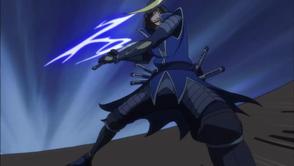 Sengoku Basara
Sengoku Basara
Rating: 2
Review: Recasting the real-life players in Japan's Warring States period as camped-up anime super-heroes (and villains) is one of those ideas that could either be cracked genius or the height of idiocy. Sengoku Basara isn't the height of idiocy. But it does come pretty close.
Though modeled after actual events (one assumes), the plot is basically nonsense: a series of martial maneuvers that serve to set up apocalyptic one-on-one confrontations between various historical figures. Primarily, in this case, between the hot-headed Sanada Yukimura and calculating Date Masamune.
The show gallops from fight to fight, which is probably a good thing, since it leaves less time to dwell on the awful dialogue and crude characterizations and offers multiple opportunities to appreciate the slick action visuals. Unfortunately, the slickness of their visuals is pretty much the only commendable attribute of the fights, which are so steeped in ridiculous bombast (Yukimura and Date's fight raises a Fat Man-sized mushroom cloud) that they work only as anime-action parodies.
Which they may well be intended as. It's probably no coincidence that Yukimura's silly exchanges with his general (and the mildly homoerotic fun they poke at male bonding) continually steal the show. Indeed much of the show works better if approached as a poker-faced spoof. Hell, parody is the only possible explanation for some of it—particularly the hideous costume design. Parody...or an extended flashback to a bad 80's acid trip. The sight of respected general Uesugi proudly strutting about in an outfit that he apparently pilfered from some moth-eaten corner of Queen Elizabeth's wardrobe is enough to convince even the stoutest soul that they're reliving a pharmacological mistake made during a Ziggy Stardust concert.
 Shangri-La
Shangri-La
Rating: 4
Review: In the future, Tokyo has been transformed into a forest city in an attempt to reduce the city's carbon dioxide emissions and temperature. The world economy is dominated by a complex system of taxes and carbon “credits” designed to control the proliferation of greenhouse gasses. One thing hasn't changed, however: the ones who suffer are the poor and underprivileged. Their champion comes in the unlikely form of Kuniko Houjou, a seemingly careless young girl with a free spirit and leadership skills all out of proportion to her tender age. The heir apparent of an anti-government guerrilla force called Metal-age, Kuniko is fresh out of prison—where she enjoyed unparalleled popularity—and looking to enjoy her freedom, when an act of relatively innocent protest (her supporters burn some dioxide-laden coal to celebrate her release) is met with deadly force by the private army of Atlas—the obligatory sinister corporation. Kuniko rallies her forces and takes on the army...armed with nothing but a boomerang, of course.
There's no doubt that Shangri-La has a big ol’ axe to grind. Its future vision is strongly shaped by the social and environmental concerns of today, and it isn't shy about info-dumping its ideas into viewers’ laps. But don't take that to mean that it's boring. Shangri-La’s ideas are housed in a sci-fi epic of genuine visual splendor and considerable entertainment value, anchored by an appealing female lead and beautifully rendered by the animators at Gonzo. Even as the series takes time to linger on riparian Tokyo and explain the economics of carbon credits, it's moving forward at a rapid clip, maneuvering Kuniko towards grudgingly accepting her role as paladin of the underdog and culminating in a rousing girl vs. tank action set piece.
High concept anime at its best. Also featuring the delectable designs of Range Murata.
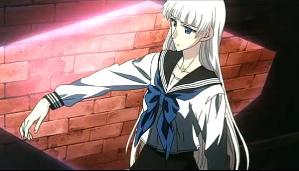 Natsu no Arashi
Natsu no Arashi
Rating: 3
Review: Coming from Jin Kobayashi, the same guy who created the uproarious School Rumble, Natsu no Arashi is surprisingly unfunny. It has a premise rife with comic potential and is animated by frequent collaborators and dual comic talents Shin Oonuma and Akiyuki Shinbo (Pani Poni Dash!), so where's the hilarity? Okay, to be fair, from the outset it's obvious that hilarity isn't Arashi’s intent. The series kicks off with a typical day in the life of precocious inventor/inveterate brat Hajime as he tries, with the help of time-travelling high school girl Arashi, to use his newly invented Cutie Strawberry-Chan (a pepper-bomb disguised as a luscious fruit) on all of his enemies—including the scar-faced thug who disses him and the young stud who dares to hit on Arashi. His plans go awry when his Cutie Strawberry-Chan makes its way onto the strawberry shortcake of his volatile, sweets-loving boss Kaya—herself an experienced time-traveler.
The coffee-house setting (where Hajime and Arashi work) should be a dead giveaway that Kobayashi's goal is slice-of-life magical realism more so than outright comedy (aren't all slice-of-life series set in coffee shops?). Nevertheless, the series obviously strives for a certain degree of funny, which it soundly fails to achieve, beginning with Hideo's frankly irritating antics and concluding with the convoluted but not particularly funny time-travel paradoxes of the climax. As for magical realism, the series fails to establish the requisite sense of wonder, while Shinbo's abstract visuals and discontinuous editing combine with Kobayashi's poor grasp of slice-of-life pacing to crowd out any possibility of Yokohama Kaidashi Kikou-styled languor.
It should be noted that, even if they aren't particularly funny, the time-traveling complications are genuinely clever. If you're so inclined, you can take that as a hint that what's to come will be better. And oh yeah, the fan-service is superb.
Natsu no Arashi is available streaming on Crunchyroll.
 Saki
Saki
Rating: 3 (of 5)
Review: Mahjong tiles crackle with electricity as they are slammed on the table, spectators thrill at the audacity of the plays, and opponents gasp as the tables are turned—welcome to the final minutes of Saki, where the overwrought conventions of the sports anime meet once again the usually sedate world of competitive gaming. You've seen this particular collision before, most notably in Hikaru no Go, but this time the game is mahjong, and the pretty boys have been supplanted by pretty girls.
Saki hates mahjong. She tells long-time friend Kyou as much, but he still insists on dragging her to the school's mahjong club to fill an empty seat at their daily mahjong game. She acquits herself reasonably well and is about to leave when the club's president notices something odd. Saki scored a perfect zero in every game she played. Coincidence? The prez thinks not, and neither does club ace Nodoka, whose pride is wounded by what she sees as a deliberate attempt on Saki's part to throw the game. As fate would have it, they're not wrong. Long experience playing against her family of bad losers has conditioned Saki to channel her supernatural talents into losing rather than winning...and always with the exact same score.
Naturally a rematch ensues, and what follows are several of the silliest minutes you're likely to enjoy this season. The matches, with their jargon-jumbled sideline commentary by the club president, will of course make little sense to the mahjong ignorant, but the melodramatic visuals speak a universal language, ramping the contests up to the level of ripe cheese while retaining a surprising amount of the excitement inherent in competition. More than a little dumb, but bright, cute and amusing enough to excuse a return trip.
Saki is currently available streaming on Crunchyroll.
 Arad Senki -Slap Up Party-
Arad Senki -Slap Up Party-
Rating: 2 ½
Review: Slap Up Party wears its odd character designs and prominent sense of humor like a long-dead Christmas tree with a couple of shiny new ornaments. The ornaments are nice, but they're just there to distract from the dried up hulk housing them. Baron, your standard issue rowdy but kindhearted swordsman, is captured by a group of mousy villagers. The villagers, noting his demon arm, truss him up (along with his accidental travelling partner, gunner Kabenshisu) and toss them in a smelly dungeon. Though Kabenshisu takes poorly to imprisonment, Baron—whose sole concern is discovering a cure for the curse that is slowly transforming him into a demon—takes it calmly is stride. Until a stampede of ghoulies overruns the village.
The wild character designs are fun to look at and Kabenshisu's bizarre antics are amusing (largely because of the horrified reactions they provoke from onlookers), but the story they adorn unfortunately sticks like over-chewed gum to its decaying RPG formulas. Will Baron come to the villagers’ rescue? Will Kabenshisu join Baron's party? Will the party eventually come to include other characters with specialized “classes?” Will a bat upside your noggin give you a headache?
Thankfully the series isn't stone stupid enough to take itself seriously, and it squeezes in a couple of reasonably nifty action sequences towards the end; however, the humor is too straightforward to be truly subversive (viva la pratfall!) and the shonen touches too derivative to really spice things up (Will Baron turn out to have untapped sword-fighting potential? Ooh, the suspense). There are moldier genre mummies out there (see Ragnarok...or better yet, don't), but that doesn't change the fact that it's musty, clumsy and belongs in a crypt.
 Hayate the Combat Butler Season 2
Hayate the Combat Butler Season 2
Rating: 2 ½
Review: Hayate, the financially cursed but romantically blessed butler, returns for another season of romantic comedy—emphasis on the (attempted) comedy. With the school marathon coming up, Hayate plans to whip the sports-hating Nagi into shape, only to be stunned by the true depths of her athletic incompetency. After running fifty yards in five minutes, Nagi is ready to dump the whole sorry business, but when head butler Klaus maligns Hayate for his inability to motivate her, the smitten hieress rashly promises to win the marathon. The wager? Hayate's job. Character hi-jinks ensue...even if hilarity doesn't.
Like any sequel, one's fondness for this series is going to rely on one's fondness for its predecessor. After all Hayate's unflappable charm (so rare in a romantic lead) has hardly changed and as this episode demonstrates with strident redundancy, neither have the charms (or lack thereof) of anyone else. That said, this season sees the franchise entrusted to an entirely new crew of animators, so there's plenty of reason to expect some changes. Unfortunately the first episode is so hell-bent on reintroducing the cast that it's pretty much impossible to tell if any are in the offing. After a voice-over recap of the previous season, the episode uses its marathon premise to pinball from one established character to another, taking the time each encounter to throw in a pop-up introduction. Ever wonder what Klaus’ blood type is? Here's your chance to find out! It's obviously intended to make it easy for first-timers to grasp Hayate’s basic premise and relationships, but it unfortunately obscures the series’ main appeal—its headlong energy and humor. As such, if you've never seen Hayate, this isn't the best introduction. But if you're already a fan then watch away...but beware: this wouldn't be the first series that newly appointed director Yoshiaki Iwasaki's relentlessly fluffy touch drained of all its fun.
 Phantom – Requiem for the Phantom
Phantom – Requiem for the Phantom
Rating: 3 ½
Review: Koichi Mashimo returns again to the obtuse tales of amnesiacs and assassins that bore him hits like Noir and Madlax. This time the series’ blank-slate killer is a nameless Japanese tourist who has been captured, drugged and memory-wiped by a shadowy organization known as Inferno. After a surreal initiation during which a vulpine scientist awakens his murderous instincts with the help of a pretty but lethally skilled assassin named Ein, he is given the title Zwei and partnered with Ein. Together they become Inferno's most feared enforcers, butchering the organization's enemies with the cold efficiency of de-humanized machines.
Mashimo is a past master of this style of entertainment, and he wastes no time in establishing a series of mysteries (cue the schemers in the shadows) and laying on the expertly crafted gunfights. Clearly back in his element, his visuals are at turns crisp and lush, full of fluid touches that stave off the stylistic malaise that bogged down his work on series like Tsubasa and Avenger. He even tosses in one of his obligatory cinematic references (from Brian DePalma's Scarface ) for good measure and drops a few hints of restrained romance, raising the tantalizing possibility of a twisted romantic relationship between a pair of murderous puppets. It's that possibility, even more so than the series’ polished craft, that really intrigues. The hints of conspiracy may fly thick, but ultimately it is how Mashimo humanizes his often eerily inhuman protagonists (that recurrent puppet imagery!) that will ultimately determine whether this series is able to emerge from under the shadow of his previous works.
 K-ON!
K-ON!
Rating: 3
Review: Yui Hirasawa is a world-class klutz. She gets flustered easily, tripping, falling and bumping into pretty much everything in sight. She's also easily distracted, and, as the opening montage of her petting cats and helping little old ladies takes pains to point out, a good hearted and good natured young girl. Newly enrolled in high school, she's looking forward to joining a club, but in typically airheaded fashion, can't decide which to join. When she recalls a childhood memory of being praised for her skill with castanets (the only instrument she can play), she impulsively decides to join the light music club. Club-mates Mio, Ritsu and Tsugumi have only just joined themselves, and at only three strong the club is on the razor edge of dissolution, so Yui's arrival is a godsend. Even if she, like they, can't play worth beans. Who ever said that a lead guitarist actually had to know how to play a guitar anyway?
Cuteness for cuteness’ sake. There really is very little else to say. The premise—clumsy girl joins inexperienced band—is cute. The characters are cute. Their behavior is cute. The so-light-it's-almost-nonexistent humor is cute. Everything about this production screams cuteness. No surprise coming from Kyoto Animation, the guys who brought us the relentlessly cute Lucky Star, but it still would have been nice to see something a little more substantial. They are, after all, also the guys who brought us The Melancholy of Haruhi Suzumiya. That said, it is really cute, and unlike many of its cute-mates is actually pretty fun. Yui and her club-mates are simply adorable (thanks in no small part to Kyoto Animation's mastery of uber-cute body-language), the pace fairly brisk and the music-club setting interesting. Unlikely to go anywhere of import, but a fine fluffy diversion for the substance-averse.
 Queen's Blade
Queen's Blade
Rating: 1 ½
Review: Need your seasonly dosage of trash? Look no further. Voluptuous warrior babes, a melon-breasted demon that squirts explosive acid from her nipples, and more casual nudity than a honky-tonk strip bar during Mardi Gras—what more could a guy want? Besides a plot and actual characters, that is. Leina is the busty middle daughter of a respected noble family. When she runs afoul of an acid-squirting demon, she is saved by a busty bandit named Risty. As there is a reward for her return, Risty escorts Leina back to her family. But instead of a reward, Risty gets thrown into the family dungeon. She escapes, robbing Leina's folks blind, but when Leina saves her from recapture, Risty allows her to take part of the treasure: a metal bra that is apparently intended as armor. When the lactating demon returns, Leina dons her steel undergarment and does battle with the jiggly fiend.
There's also some background nonsense about the “Queen's Blade Tournament” featuring a winged girl who butchers the series’ sad-sack attempts at humor. The whole thing is exactly as nonsensical as it sounds; the barest excuse to thread together a series of half-clad smackdowns between torpedo-breasted lady warriors. All of whom seem to have been endowed with personality in inverse proportion to the size of their breasts...or perhaps in direct proportion to the amount of clothing they wear. They are attractive enough in their own overdeveloped way, but it's difficult to enjoy the designs when the series is so busy having them drool and wet themselves during fights. On the upside, the episode's climax—during which the demon's nipples are blocked, causing her breasts to swell to the size of hot-air balloons and explode—is so unbelievably bad that it's hilarious.
 Mainichi Kāsan
Mainichi Kāsan
Rating: 2 ½ (of 5)
Review: If the performance of past series with terrible art and a focus on everyday life is any indicator, Mainichi Kāsan is destined for a fat slice of the viewership pie. What with Sazae-san, Crayon Shin-chan, and Chibi Maruko-chan regularly garnering double-digit ratings it's no wonder that the folks at TV Tokyo jumped on Kāsan. The over-simplified art borders on the hideous, the tone is vaguely heartwarming, and the humor is slanted more towards comfy smiles than stomach-knotting guffaws. In short, it's a virtual clone of Sazae-san and its ilk. Sazae being one of the longest-running anime series of all time, there are worse titles to emulate, but frankly it's hard to see how Kāsan has anything to add to the genre.
The series details the life of the titular mother's four-person family (Mother, Father, daughter Fumi and son Bunji) with an absolute lack of ambition, resolutely avoiding anything that smacks of insight or conflict. The characters are of the broadest stereotypes—harried mother, hard-working, hard-drinking father, cute, well-behaved daughter, rambunctious son—and the humor is of the basic “kids do the darnedest things” type. It's tolerably funny, occasionally sweet and stupendously shallow—nothing that you can't get from your local funnies page, and with less hassle to boot. Director Mitsuru Hongo's skills (he directed the wonderfully atmospheric Shamanic Princess among others) are flagrantly wasted.
Mainichi Kaasan is currently available streaming on Crunchyroll.
discuss this in the forum (656 posts) |
this article has been modified since it was originally posted; see change history
back to The Spring 2009 Anime Preview Guide
Season Preview Guide homepage / archives